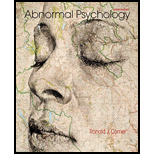
Introduction
Psychotropic drugs are used as a part of the psychiatric treatment of mental disorders. These drugs affect the mental state, emotions, perceptions, and behavior of a person. The most common disorders treated with psychotropic medications are schizophrenia, bipolar disorder, and borderline personality disorders. However, the overuse of these drugs can cause people to rely more on drugs as a solution to even the smallest of issues.
Explanation of Solution
Suggested response
One consideration might be that psychotropic drugs were originally intended to relieve intense anxiety and treat mood disorders, along with psychotherapeutic treatment. Anti-anxiety medications, anti-panic medications, or mood stabilizers are certain legal psychotropic medicines.
However, the persuasive advertisement of these medications as well as the persistent emphasis on the effectiveness of these drugs have distorted people's perception about their normal use. Therefore, it has weakened people's perception about their own self-efficacy to improve their mental states, and consequently, it has become normal to over-rely on psychotropic medications.
Psychotropic medications are meant to control severe mood swings or extremely aggressive episodes, which would help people regulate intense emotions and learn coping skills through psychotherapy for an optimal and functional coping mechanism. However, people can rely more on psychotropic medications than learning skills to regulate their thoughts and emotions. They show dependence on external factors, such as drugs, to deal with their mental issues.
This common tendency to choose over-the-counter drugs for instant relief over therapeutic coaching, which requires effort on the part of the client, shows that humans tend to rely on quick and effortless relief.
Want to see more full solutions like this?
- Burnout refers to a sense of emotional and physical exhaustion that can result from intense relationships that place stress on those responsible for the provision of services to others. True or Falsearrow_forwardPart Three: Identity and the Humanities In this section, you will reflect on how the humanities influence understanding of self-identity. Address the following criteria in Part Three. Describe the relationship between the humanities and self-identity. How do creative works impact the way people view themselves? Describe sociocultural factors that influence identity construction. How do sociocultural factors, such as ethnicity, race, religion, and sexuality, influence one’s identity? Explain how different humanities subject areas can be used to understand one's identity. Consider the relationship between the different humanities subject areas (literary, visual, and performing arts) and identity. Explain how diverse perspectives influence self-concept. Consider examples of diverse perspectives discussed in this course. Consider one to three perspectives other than your own that influence self-conceptarrow_forwardExplain TWO (2) key factors influencing Gestalt Psychologists’ concept of insightful learning and TWO (2) key factors influencing Edward Thorndike’s trial and error learning.arrow_forward
- Explain TWO (2) key factors influencing Gestalt Psychologists’ concept of insightful learning and TWO (2) key factors influencing Edward Thorndike’s trial and error learning.arrow_forwardExplain TWO (2) key factors influencing Gestalt Psychologists’ concept of insightfullearning and TWO (2) key factors influencing Edward Thorndike’s trial and errorlearning.arrow_forwardBrief counseling focuses on ______________. a. the origin of the problem(s). b. the nature of the problem(s). c.. the exceptions of or to the problem(s). d. the maintenance of the problem(s).arrow_forward
- Resilience is defined as ___________. a. the capacity to overcome identifiable risk factors and avoid negative outcomes. b. the capacity to reach out for help. c. the capacity to deal with trauma. d. the capcity to overcome negative consequences.arrow_forwardWhich of the following characterizes emotional development during mid-adolescence? Group of answer choices a.Being better able to deal with emotionally charged issues. b.Rapid mood fluctuations. c. Being overwhelmed by emotions. d. all of these.arrow_forwardOfficial policy is policy that is espoused by the majority, the experts, and the rule makers; law is the policy in practice. true or falsearrow_forward
- A worker trained to engage in helping services who has not reached a professional level of education or function is called a professional. True or falsearrow_forwardAdvocates helps people get to existing services and helps the service relate more easily to clients. true or false?arrow_forwardHuman services can be defined as a field that helps individuals cope with problems of a social welfare, psychological, behavioral, and/or legal nature. True or Falsearrow_forward
 Ciccarelli: Psychology_5 (5th Edition)PsychologyISBN:9780134477961Author:Saundra K. Ciccarelli, J. Noland WhitePublisher:PEARSON
Ciccarelli: Psychology_5 (5th Edition)PsychologyISBN:9780134477961Author:Saundra K. Ciccarelli, J. Noland WhitePublisher:PEARSON Cognitive PsychologyPsychologyISBN:9781337408271Author:Goldstein, E. Bruce.Publisher:Cengage Learning,
Cognitive PsychologyPsychologyISBN:9781337408271Author:Goldstein, E. Bruce.Publisher:Cengage Learning, Introduction to Psychology: Gateways to Mind and ...PsychologyISBN:9781337565691Author:Dennis Coon, John O. Mitterer, Tanya S. MartiniPublisher:Cengage Learning
Introduction to Psychology: Gateways to Mind and ...PsychologyISBN:9781337565691Author:Dennis Coon, John O. Mitterer, Tanya S. MartiniPublisher:Cengage Learning Psychology in Your Life (Second Edition)PsychologyISBN:9780393265156Author:Sarah Grison, Michael GazzanigaPublisher:W. W. Norton & Company
Psychology in Your Life (Second Edition)PsychologyISBN:9780393265156Author:Sarah Grison, Michael GazzanigaPublisher:W. W. Norton & Company Cognitive Psychology: Connecting Mind, Research a...PsychologyISBN:9781285763880Author:E. Bruce GoldsteinPublisher:Cengage Learning
Cognitive Psychology: Connecting Mind, Research a...PsychologyISBN:9781285763880Author:E. Bruce GoldsteinPublisher:Cengage Learning Theories of Personality (MindTap Course List)PsychologyISBN:9781305652958Author:Duane P. Schultz, Sydney Ellen SchultzPublisher:Cengage Learning
Theories of Personality (MindTap Course List)PsychologyISBN:9781305652958Author:Duane P. Schultz, Sydney Ellen SchultzPublisher:Cengage Learning





